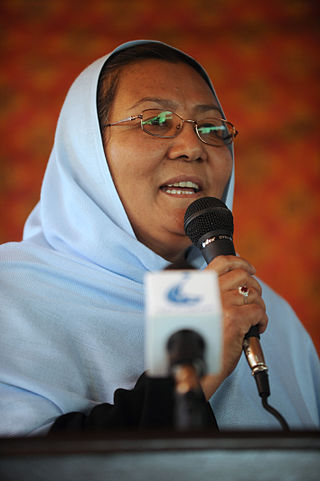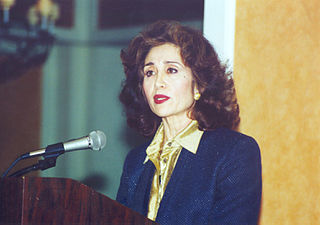Related Research Articles

The Taliban, which also refers to itself by its state name, the Islamic Emirate of Afghanistan, is an Afghan militant movement with an ideology comprising elements of Pashtun nationalism and the Deobandi movement of Islamic fundamentalism. It ruled approximately 75% of the country from 1996 to 2001, before it was overthrown by an American invasion. It recaptured Kabul in August 2021 following the departure of coalition forces, after 20 years of Taliban insurgency, and now controls all the country. The Taliban government is not recognized by any country and has been internationally condemned for restricting human rights, including for women to work and have an education.

The treatment of women by the Taliban refers to actions and policies by two distinct Taliban regimes in Afghanistan which are either specific or highly commented upon, mostly due to discrimination, since they first took control in 1996. During their first rule of Afghanistan, the Taliban were notorious internationally for their misogyny and violence against women. In 1996, women were mandated to wear the burqa at all times in public. In a systematic segregation sometimes referred to as gender apartheid, women were not allowed to work, nor were they allowed to be educated after the age of eight. Women seeking an education were forced to attend underground schools, where they and their teachers risked execution if caught. They were not allowed to be treated by male doctors unless accompanied by a male chaperone, which led to illnesses remaining untreated. They faced public flogging and execution for violations of the Taliban's laws.

Dr. Massouda Jalal is the first woman in the history of Afghanistan who ran for the Office of the President of Afghanistan in 2002, 2004, and again in 2019. Dr. Jalal emerged as a leading voice of Afghan women after her election as the Representative to the 2002 Loya Jirga as she became one of the frontrunners for the position of Interim President of Afghanistan, opposite to ex-president Hamid Karzai.

Dr. Habiba Sarābi is a hematologist, politician, and reformer of the reconstruction of Afghanistan after the Taliban first took power. In 2005, she was appointed as Governor of Bamyan Province - the first Afghan woman to become a provincial governor. She had served as Afghanistan's Minister of Women's Affairs and as Minister of Culture and Education. Sarabi was instrumental in promoting women's rights and representation and environmental issues. She belongs to the ethnic Hazara people of Afghanistan. Her last name is sometimes spelled Sarobi.

The Northern Alliance, officially known as the United Islamic National Front for the Salvation of Afghanistan, was a military alliance of groups that operated between early 1992 and 2001 following the dissolution of the Soviet Union. At that time, many non-Pashtun Northerners originally with the Republic of Afghanistan led by Mohammad Najibullah became disaffected with Pashtun Khalqist Afghan Army officers holding control over non-Pashtun militias in the North. Defectors such as Rashid Dostum and Abdul Momim allied with Ahmad Shah Massoud and Ali Mazari forming the Northern Alliance. The alliance's capture of Mazar-i-Sharif and more importantly the supplies kept there crippled the Afghan military and began the end of Najibullah's government. Following the collapse of Najibullah's government the Alliance would fall with a Second Civil War breaking out however following the Islamic Emirate of Afghanistan's (Taliban) takeover of Kabul, The United Front was reassembled.

Lesbian, gay, bisexual, and transgender (LGBT) people in the Islamic Emirate of Afghanistan face severe challenges not experienced by non-LGBT residents. Afghan members of the LGBT community are forced to keep their gender identity and sexual orientation secret, in fear of violence and the death penalty. The religious nature of the country has limited any opportunity for public discussion, with any mention of homosexuality and related terms deemed taboo.
Human rights in Afghanistan are severely restricted, especially since Taliban's takeover of Kabul in August 2021. Women's rights and freedom are severely restricted as they are banned from most public spaces and employment. Afghanistan is the only country in the world to ban education for women over the age of eleven. Taliban's policies towards women are usually termed as gender apartheid. Minority groups such as Hazaras face persecution and eviction from their lands. Authorities have used physical violence, raids, arbitrary arrests and detention, torture, enforced disappearances of activists and political opponents.

Malalai Joya is an activist, writer, and a politician from Afghanistan. She served as a Parliamentarian in the National Assembly of Afghanistan from 2005 until early 2007, after being dismissed for publicly denouncing the presence of warlords and war criminals in the Afghan Parliament. She was an outspoken critic of the Karzai administration and its western supporters, particularly the United States.

Women's rights in Afghanistan have oscillated back and forth depending on the time period as well as the regime in power. After King Amanullah Khan's attempts to modernize the country in the 1920s, women officially gained equality under the 1964 Constitution. However, these rights were taken away in the 1990s through different temporary rulers such as the mujahideen and the Taliban during the Afghan civil war. During the first Taliban regime (1996–2001), women had very little to no freedom, specifically in terms of civil liberties. When the Taliban was overthrown by the United States following the September 11 attacks, women's rights gradually improved under the presidential Islamic Republic of Afghanistan. Women were de jure equal to men under the 2004 Constitution.
The Shia Personal Status Law, also known as the Shia Family Law, is a law of Afghanistan that was approved in February 2009 with Afghan President Hamid Karzai's signature. A portion of the law pertaining to sexual relations between husband and wife made international headlines. The United Nations Development Fund for Women, NATO, Canada, United States, Germany and other nations came forward asking for a review of the law, as it was felt that it oppresses Shiite women, taking away many of their rights in a marital relationship. Most controversially, Article 132 specifies that Shia women are required to sexually submit to their husband's demands and are expected to have intercourse with their husband at least once every four days except in case of illness, in what has been described as spousal rape.

The Hazaras have long been the subjects of persecution in Afghanistan. The Hazaras are mostly from Afghanistan, primarily from the central regions of Afghanistan, known as Hazarajat. Significant communities of Hazara people also live in Quetta, Pakistan and in Mashad, Iran, as part of the Hazara and Afghan diasporas.

Maryam Durani is an Afghan activist and women's advocate. In 2012 she received the International Women of Courage Award.
Rape is a major issue in Afghanistan. A number of human rights organizations have criticized the country's rape laws and their enforcement.

Sima Wali was one of the foremost Afghan human rights advocates in the world, serving as an international campaigner for the liberties and empowerment of refugee and internally displaced populations. She was the Chief Executive Officer of Refugee Women in Development (RefWID), Inc., a global non-profit organization that advocated for the civil rights of refugee women and girls fleeing from conflict and for their equitable reintegration into their societies. She was also the vice president of the Sisterhood Is Global Institute, the world’s first feminist think tank.

Jamila Afghani is a feminist and an activist for women's rights and education in Afghanistan. She is the founder and executive director of the Noor Educational and Capacity Development Organization (NECDO). She is also an executive member of the umbrella organization Afghan Women's Network (AWN). In 2022, Jamila Afghani was awarded the seventh annual Aurora Prize for Awakening Humanity.
Aziza Ahmadyar is an Afghan politician and women's rights activist. She also founded the Afghan Women's Resource Center. Currently, Ahmadyar is a Foreign Liaison Director for the Ministry of Information, Culture and Tourism in Afghanistan.
Farida Azizi is an Afghan advocate for peace and women's rights. Azizi has consulted with President George W. Bush and Hillary Clinton on women's roles in helping to rebuild Afghanistan. Azizi is a founding member of the Corporation for Peace and Unity in Afghanistan and is a member of the Afghan Women's Network. She one of the subjects of a play, Seven.

Mullah Hibatullah Akhundzada, also spelled Haibatullah Akhunzada, is an Afghan cleric who is the supreme leader of Afghanistan in the internationally unrecognized Taliban regime. He has led the Taliban since 2016, and came to power with its victory over U.S.-backed forces in the 2001–2021 war. A highly reclusive figure, he has almost no digital footprint except for an unverified photograph and several audio recordings of speeches.

Roya Rahmani is an Afghan diplomat who served as Afghanistan's first female ambassador to the United States and non-resident ambassador to Mexico, Argentina, Colombia, and the Dominican Republic from December 2018 to July 2021. She is currently the Chair of the international advisory company in development finance — Delphos International LTD. She is also a distinguished fellow at the Georgetown Institute for Women, Peace, and Security, a senior advisor at the Atlantic Council's South Asia Center, and a senior fellow for international security at the New America Foundation. From 2016 to 2018, she served as Afghanistan's first female ambassador to Indonesia, first ever ambassador to the Association of Southeast Asian Nations, and non-resident ambassador to Singapore.
War crimes in Afghanistan covers the period of conflict from 1979 to the present. Starting with the Soviet invasion of Afghanistan in 1979, 40 years of civil war in various forms has wracked Afghanistan. War crimes have been committed by all sides.
References
- 1 2 3 4 Basel, Marzia; Hollywood, Dana Michael (2005). "Under a Cruel Sun: My Life as a Female Judge and Underground Educator Under the Soviets, the Taliban, and the Americans". William & Mary Journal of Women and the Law. 12 (1): 205–238. Retrieved 18 September 2015.
- 1 2 3 4 "Afghan Judge in Tangle Over Her Uncovered Hair". Toronto Star. 26 December 2002. Retrieved 18 September 2015– via Newspaper Source – EBSCOhost.
- 1 2 "Contested Terrain: The Future of Afghan Women". International Security. May 2015. Retrieved 18 September 2015.
- 1 2 "Project for Afghan Women's Leadership: Afghan Women Leaders Speak" (PDF). Mershon Center for International Security Studies. Ohio State University. November 2005. hdl:1811/30223 . Retrieved 13 September 2015.
- 1 2 "Marzia Basel". Wise Muslim Women. Women's Islamic Initiative in Spirituality and Equality. Retrieved 18 September 2015.
- 1 2 3 4 5 Kitch, Sally L. (2014). Contested Terrain: Reflections With Afghan Women Leaders. Champaign, Illinois: University of Illinois Press. pp. 27–30, 84, 181–186. ISBN 978-0-252-09664-8.
- ↑ Mills, Margaret A. (2006). "'Afghan Women Leaders Speak': An Academic Activist Conference, Mershon Center for International Security Studies, Ohio State University, November 17–19, 2005" . NWSA Journal. 18 (3): 191–201. Retrieved 18 September 2015.